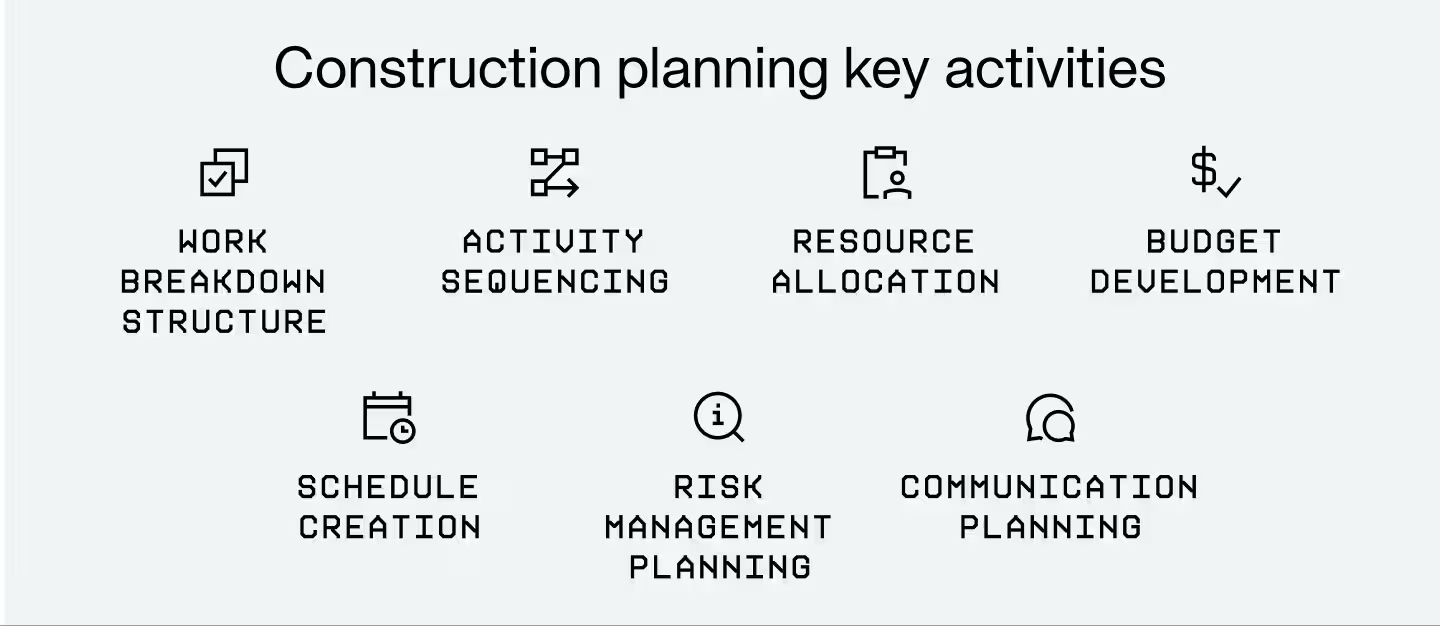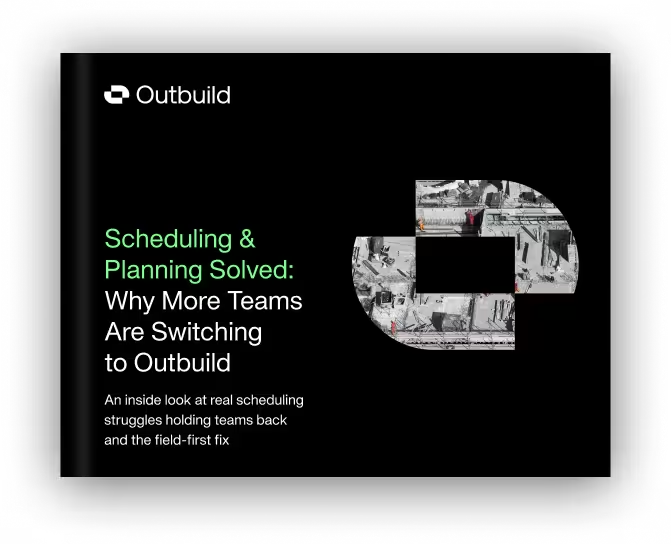Outbuild is online scheduling software to work together on connected project schedules and look-aheads, enabling everyone to move faster.
Key Takeaways
Table of contents
- Preconstruction: Planning Before the Build
- The Core: Your Construction Project Plan
- Planning a Build
- Key Points to Consider for Construction Planning
- Why Construction Planning Matters
- What is project planning in construction: Methods & Tools
- Building Success Through a Project Plan for Construction
Breaking ground on a project can feel like setting sail on a journey. Just like a captain needs a map to sail, a project needs a plan to be successful.

Before a project breaks ground, there's a crucial phase called preconstruction. The general contractor begins by clearly laying out the project goals and figuring out any potential problems.
This early stage involves careful planning. It includes setting a timeline for the work and estimating costs.
Think of it as the behind-the-scenes work that makes the actual construction go smoothly. Good construction project planning means putting in all the right steps for efficiency, minimized risk, and budget control. Without a solid construction project plan you risk delays, budget blowouts and a final result that’s short of the mark.

This guide will walk you through the key steps of how to plan a construction project. We will explain how to make a work plan for a construction project. This will give you a clear roadmap and a realistic timeline.
You might be new to the industry and wondering how to plan a building project. Or, you may have experience and want to stay updated on new planning methods. This guide will explain each stage of the construction project planning process.
So, settle in and let's dive into project roadmapping!
At the center of every successful construction project is a well thought out construction project plan.
So, what is a plan in construction? It is your roadmap. It shows the project’s goals, how you will reach them, the tasks, and the resources needed. Think of it as the brain of your project, guiding decisions and making sure everyone is on the same page.
A plan for construction gives you many benefits:
- Clarity: It clearly defines the project’s scope, goals and how they will be achieved.
- Defined Roles: It outlines the roles of each team member and stakeholder.
- Communication: It’s a central point of reference for all communication.
- Resource Management: It helps you identify and allocate resources efficiently.
- Risk Management: It allows you to plan for potential challenges.
- Performance Tracking: It’s a benchmark to measure progress against.

Ultimately a good project construction plan is the key to staying on time, on budget and to the quality of your project. It also helps you keep track of project progression and supports buildings getting completed on time.
The process of planning a build is complex but can be broken down into two main stages. Understanding these stages of planning a build is key to managing.
The Concept Phase
In this first stage, the team establishes the project goals, scope, and viability. It’s the starting point where you identify the need for the project and the desired outcome. This stage sets the direction of the project and is the foundation for the next stages.
During this time you need to clearly articulate:
- The Project Goal: What are you trying to achieve with this build?
- The Scope: What will the project include and exclude?
- Feasibility: Is the project realistic with your resources, budget and timeline?

Comprehensive Planning
This is where the detailed planning occurs. It involves breaking the project down into smaller tasks and defining the project timeline, required resources (resource planning) and budget.
This stage also includes risk assessment where potential risks and challenges are identified and a risk management plan is developed. This stage is crucial for setting realistic expectations and ensuring the project is well structured and organized.
Key activities in construction planning include:
- Work Breakdown Structure (WBS): Divide the project into smaller tasks and sub-tasks (work planning). This creates a detailed build plan.
- Activity Sequencing: Identify the order of tasks to complete to ensure a logical flow.
- Resource Allocation: Identify and assign the necessary labour, materials, equipment and finances for each task.
- Budget Development: Create a detailed budget for all costs.
- Schedule Creation: Create a realistic project schedule. Include start and end dates for each task. Use Gantt charts to visualize it. This sets your project timeline.
- Risk Management Planning: Identify potential risks and develop strategies to mitigate or address them.
- Communication Planning: Define how the team will share information with team members and stakeholders.

- Getting the Requirements Right: Make sure you understand the client’s needs, project goals and all technical specs. Engage with stakeholders early and often to get all requirements documented correctly. This ties in with a construction project planning checklist.
- Setting a Real Budget: Overspending is a common problem in construction. Create a comprehensive and realistic budget that includes all costs, including contingencies. Working with a qualified quantity surveyor or cost consultant is a must.
- Setting a Real Timeline: A well defined and achievable project schedule is critical. Consider task dependencies, resource availability and external factors that could impact the construction project timeline. Use construction scheduling software to help with this.
- Choosing the Right Team: The success of any construction project depends on the expertise of the project team. Choose people with the right skills, experience and track record. Every project stakeholder's experience supports the build in one way or another.
- Identifying Resources: Make sure you have all the necessary resources, labor, materials, equipment and technology. Collaborate with suppliers and vendors early to ensure timely availability and best pricing. This is a key part of construction resource planning.
- Understanding the Laws and Regulations: Compliance with all relevant laws, regulations and industry standards is non negotiable. Research and understand these requirements to avoid legal issues, fines and delays. Understanding Building code is an important part of work to keep construction activity flowing.
- Risk Management Plan: Every construction project has risks. Identify potential risks and develop a plan to prevent, mitigate or manage them. Conduct regular risk assessments throughout the project lifecycle.
- Quality Control: Quality of work is paramount. Implement quality control measures, including inspections and quality standards throughout the construction process.
- Communication: Open and transparent communication with all stakeholders is key to addressing issues and keeping everyone up to date.
There are so many benefits of construction planning. Having a structured plan for your project increases the chances for a more efficient, cost effective and successful project.
Without proper planning projects will:
- Delay: Poor sequencing and no realistic schedule will result in significant delays.
- Budget Blowouts: Poor cost estimation and no financial controls will result in projects going over budget.
- Safety Issues: Insufficient planning will overlook safety protocols and increase the risk of accidents.
- Quality Defects: No clear quality standards and no monitoring will result in subpar workmanship.
- Disputes and Conflicts: Poor communication and unclear roles will result in stakeholder disagreements.
According to the 2022 FMI State of Global Preconstruction report, collaboration and the effective use of data continue to be among the biggest challenges facing preconstruction teams today (FMI Corp., 2022).
The construction planning phase is an investment that pays big dividends in the long run.
Here are construction planning methods and tools to help with planning:
- Critical Path Method (CPM) The critical path is the series of tasks that affect the project's completion date.
- Gantt Charts: Visual bar charts that show project tasks against a timeline, with start and end dates, durations and dependencies.
- Program Evaluation and Review Technique (PERT): Method to estimate activity duration when there is high uncertainty.
- Lean Construction: Philosophy to minimize waste and maximize value in the construction process.
- Construction Scheduling and Planning Software: Tools like Outbuild makes planning simple, visual, and collaborative. Unlike outdated sticky notes or complex spreadsheets, Outbuild keeps your team aligned, improves workflow sequencing, and ensures reliable commitments. Stay on schedule and reduce delays with real-time planning.
- Building Information Modeling (BIM): Digital representation of the physical and functional characteristics of a facility, used for planning, design and construction management.
- Project Management Software: Various software to assist with budgeting, resource management and communication.
The choice of construction planning methods and tools will depend on the size and complexity of the project. A good construction project manager leverages technology to support better project outcomes.
In summary, thorough construction project plans are the foundation of any successful building project. By using a clear method and understanding the steps of construction project planning, you can improve your chances. This will help you finish the project on time, stay within budget, and meet quality standards.
Remember, the time and effort you put into planning construction projects is not just a cost. It is an investment in the final result. A well crafted builders project plan and knowing construction project planning steps can ensure great project outcomes.
Now that you have answered the question ‘what is construction project planning?’ Are you ready to say goodbye to project delays? Say hello to proper planning with Outbuild by starting this 14-day free trial or booking a demo now.
There are so many benefits of construction planning. Having a structured plan for your project increases the chances for a more efficient, cost effective and successful project.
Without proper planning projects will:
- Delay: Poor sequencing and no realistic schedule will result in significant delays.
- Budget Blowouts: Poor cost estimation and no financial controls will result in projects going over budget.
- Safety Issues: Insufficient planning will overlook safety protocols and increase the risk of accidents.
- Quality Defects: No clear quality standards and no monitoring will result in subpar workmanship.
- Disputes and Conflicts: Poor communication and unclear roles will result in stakeholder disagreements.
According to the 2022 FMI State of Global Preconstruction report, collaboration and the effective use of data continue to be among the biggest challenges facing preconstruction teams today (FMI Corp., 2022).
The construction planning phase is an investment that pays big dividends in the long run.
Here are construction planning methods and tools to help with planning:
- Critical Path Method (CPM) The critical path is the series of tasks that affect the project's completion date.
- Gantt Charts: Visual bar charts that show project tasks against a timeline, with start and end dates, durations and dependencies.
- Program Evaluation and Review Technique (PERT): Method to estimate activity duration when there is high uncertainty.
- Lean Construction: Philosophy to minimize waste and maximize value in the construction process.
- Construction Scheduling and Planning Software: Tools like Outbuild makes planning simple, visual, and collaborative. Unlike outdated sticky notes or complex spreadsheets, Outbuild keeps your team aligned, improves workflow sequencing, and ensures reliable commitments. Stay on schedule and reduce delays with real-time planning.
- Building Information Modeling (BIM): Digital representation of the physical and functional characteristics of a facility, used for planning, design and construction management.
- Project Management Software: Various software to assist with budgeting, resource management and communication.
The choice of construction planning methods and tools will depend on the size and complexity of the project. A good construction project manager leverages technology to support better project outcomes.
In summary, thorough construction project plans are the foundation of any successful building project. By using a clear method and understanding the steps of construction project planning, you can improve your chances. This will help you finish the project on time, stay within budget, and meet quality standards.
Remember, the time and effort you put into planning construction projects is not just a cost. It is an investment in the final result. A well crafted builders project plan and knowing construction project planning steps can ensure great project outcomes.
Now that you have answered the question ‘what is construction project planning?’ Are you ready to say goodbye to project delays? Say hello to proper planning with Outbuild by starting this 14-day free trial or booking a demo now.
Frequently Asked Questions
Construction planning is the process of everything organized for a construction project, including all activities and resources to complete the project. It’s about setting goals, outlining tasks, creating schedules and budgets, allocating resources and identifying risks. In short, it’s a roadmap for the entire construction process from start to finish.
The Importance of construction planning can't be undervalued. It provides structure, clarity and control over a complex process. It helps avoid delays, extra costs and ensures resources are used well. Thorough project planning for construction projects is one of the most important first steps before a team even breaks ground.
It’s a detailed document that outlines the specific tasks, activities and procedures for the construction work. It includes breakdown of work packages, assigned responsibilities, timelines for each task, resources (labor, materials, equipment) and safety protocols. The construction work plan is a practical guide for the construction team on site.
The planning phase of construction projects can last from a few weeks for small homes to several months for big commercial projects. Don’t rush the timeline for a construction project, it’s the foundation of the entire project. Spending time in planning helps to identify issues early and develop robust strategies.
Planning is a team sport that brings together several key players, each with a critical role in setting the project up for success. This can include project managers, estimators, preconstruction team members and schedulers. These roles create the base for the planning phase. They work together to foresee problems, allocate resources and prepare for execution.
Related Articles
Ready to see Outbuild?
Join hundreds of contractors from 10+ countries that are saving money by scheduling better
We’ll be in touch soon!













